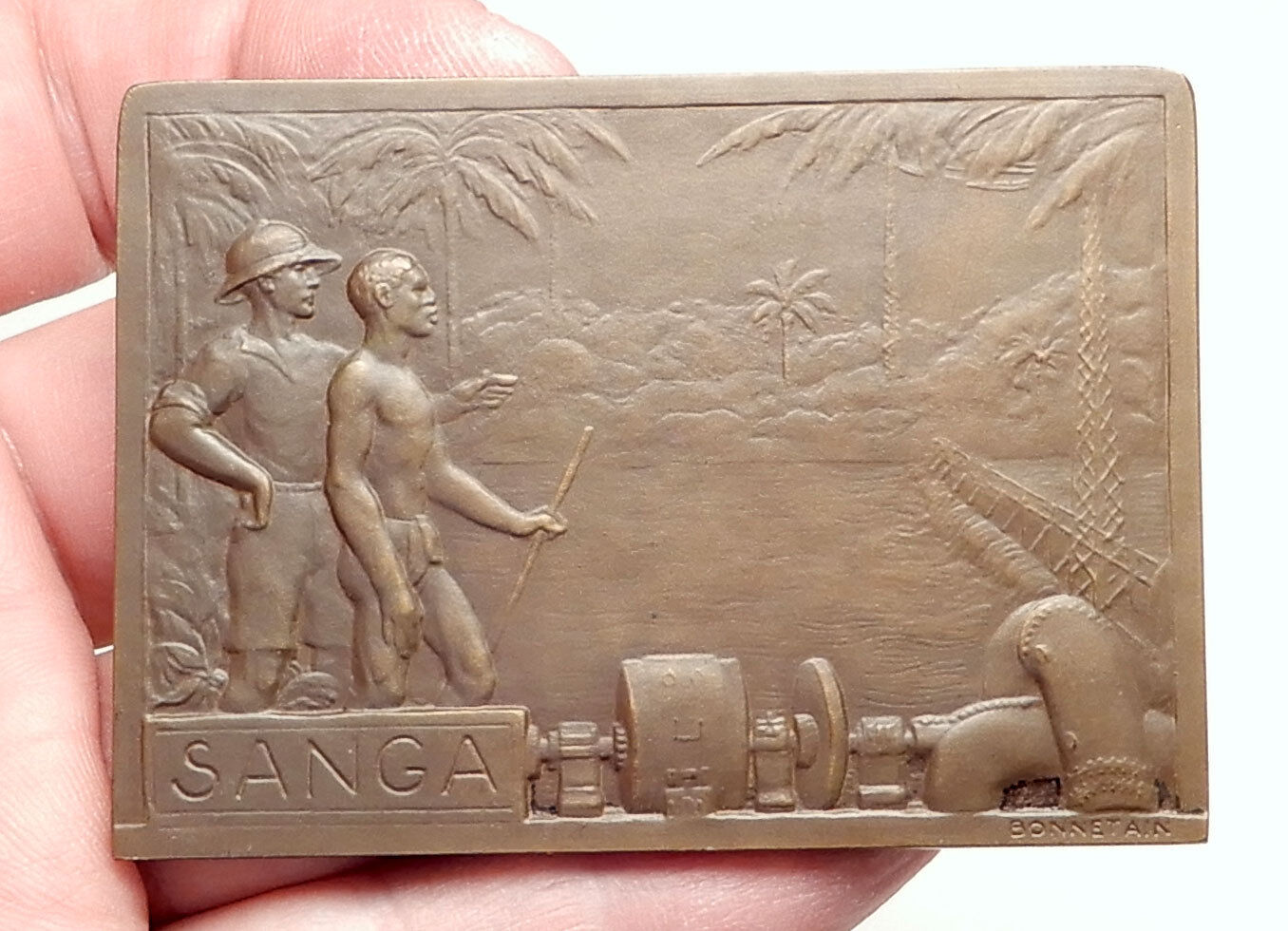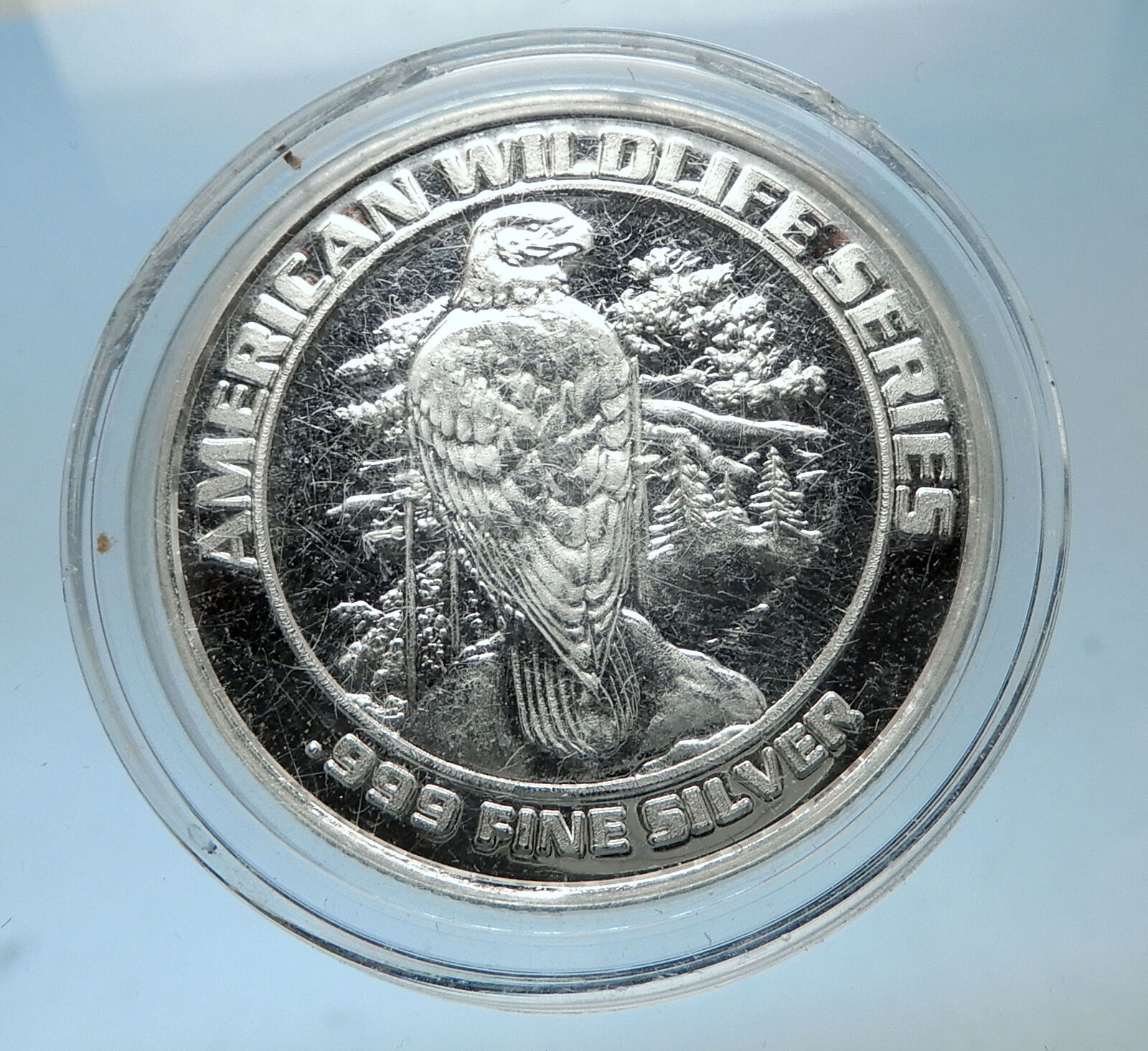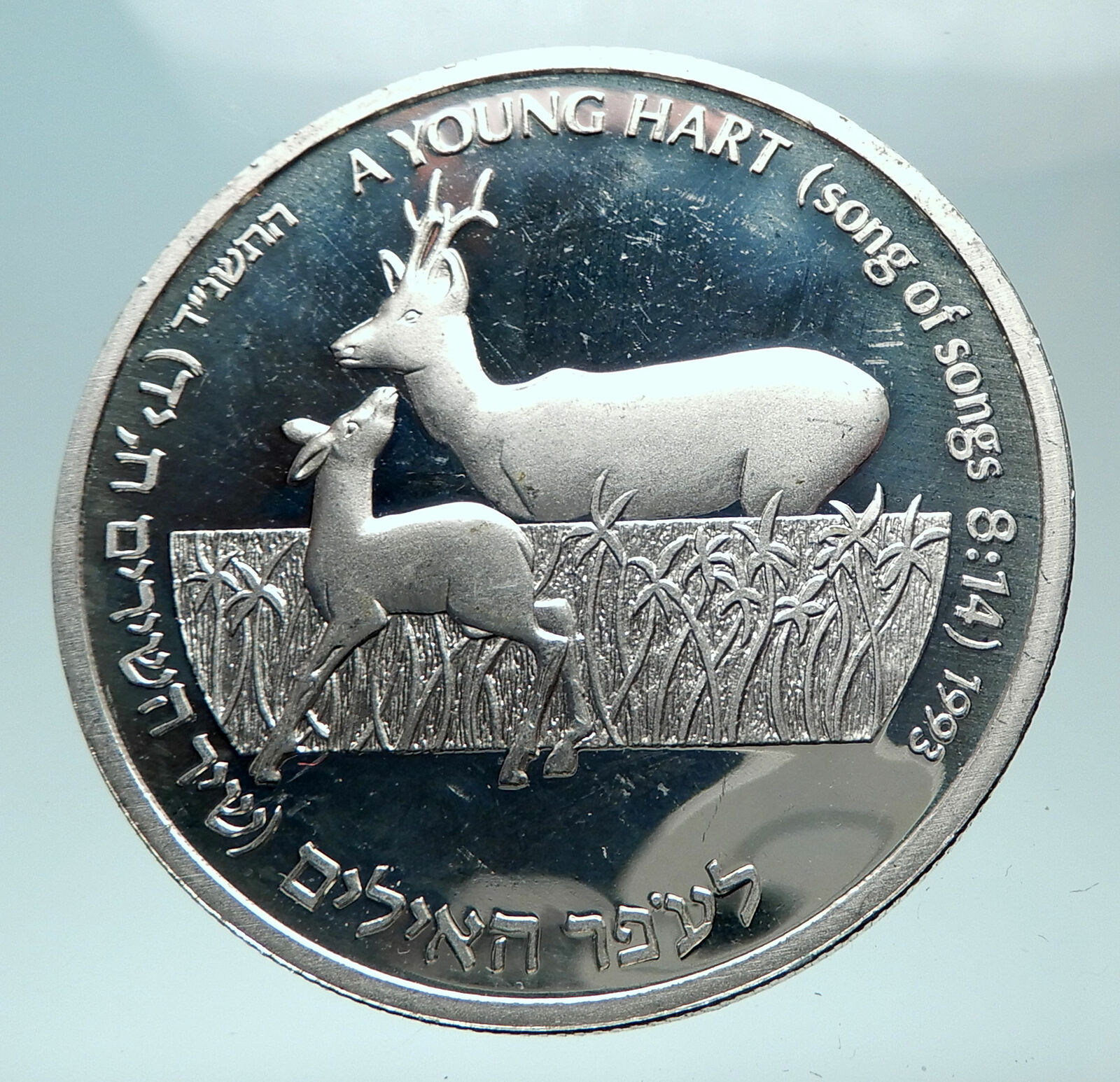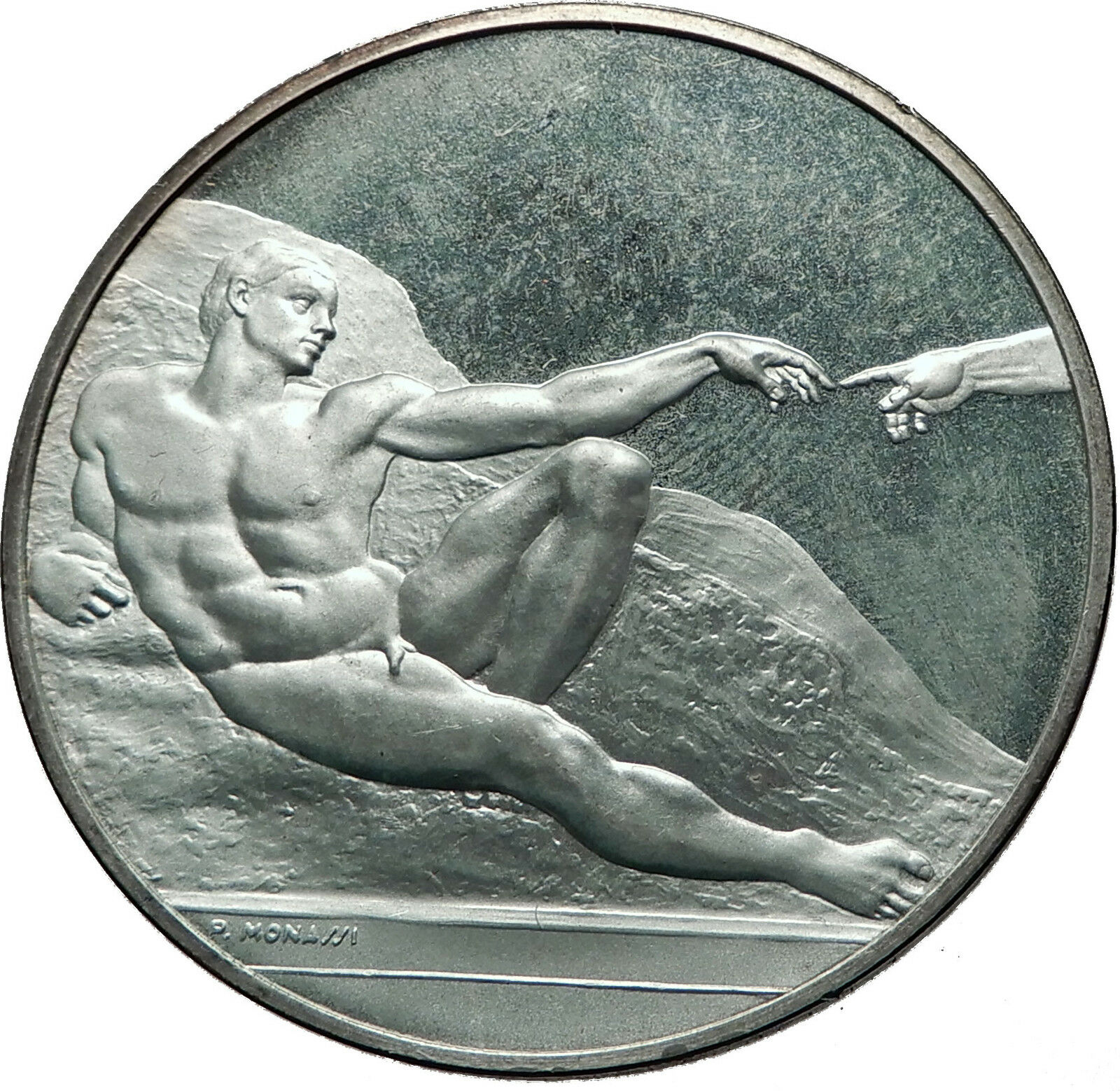|
French Equatorial Africa – Governor General Felix Eboue 60th Birthday Medal
1944 Bronze Medal 67mm (161.4 grams)
FELIX E1884 1944 GOUVERNEUR GFENERAL DE L’AFRIQUE EQUATORIALE FRANCAIS, Eboue facing left.
“PAR SA RESOLUTION LE TCHAD A DONNE LE SIGNAL DU REDRESSEMENT A L’EMIRE FRANCAIS TOUT ENTIER’ GENERAL DE GAULLE 26 AOUT 1940, Chad and African woman.
You are bidding on the exact item pictured, provided with a Certificate of Authenticity and Lifetime Guarantee of Authenticity.
 Adolphe Sylvestre Félix Éboué (1 January 1884 – 17 May 1944) was a French colonial administrator and Free French leader. He was the first black French man appointed to a high post in the French colonies, when appointed as Governor of Guadeloupe in 1936. Adolphe Sylvestre Félix Éboué (1 January 1884 – 17 May 1944) was a French colonial administrator and Free French leader. He was the first black French man appointed to a high post in the French colonies, when appointed as Governor of Guadeloupe in 1936.
As governor of Chad (part of French Equatorial Africa) during most of World War II, he helped build support for Charles de Gaulle’s Free French in 1940, leading to broad electoral support for the Gaullist faction after the war. He supported educated Africans and placed more in the colonial administration, as well as supporting preservation of African culture. He was the first black person to have his ashes placed at the Pantheon in Paris after his death in 1944.
Born in Cayenne, French Guiana, the grandson of slaves, Félix was the fourth of a family of five brothers. His father, Yves Urbain Éboué, was an orator, and his mother, Marie Josephine Aurélie Leveillé, was a shop owner born in Roura. She raised her sons in the Guiana Créole tradition.
Éboué won a scholarship to study at secondary school in Bordeaux. Éboué was also a keen footballer, captaining his school team when they travelled to games in both Belgium and England. He graduated in law from the École nationale de la France d’Outre-mer (called École coloniale for short), one of the grandes écoles in Paris.
Career
Éboué served in colonial administration in Oubangui-Chari for twenty years, and then in Martinique. In 1936 he was appointed governor of Guadeloupe, the first man of black African descent to be appointed to such a senior post anywhere in the French colonies.
Two years later, with conflict on the horizon, he was transferred to Chad, arriving in Fort Lamy on 4 January 1939. He was instrumental in developing Chadian support for the Free French in 1940. This ultimately gave Charles de Gaulle’s faction control of the rest of French Equatorial Africa.
Efforts at négritude
As governor of the whole area between 1940 and 1944, Éboué acted to improve the status of Africans. He classified 200 educated Africans as “notable évolués” and reduced their taxes, as well as placing some Gabonese civil servants into positions of authority. He also took an interest in the careers of individuals who would later become significant in their own rights, including Jean-Hilaire Aubame and Jean Rémy Ayouné.
Although a Francophile who promoted the French language in Africa, Éboué advocated the preservation of traditional African institutions as well. This was included in his circular La nouvelle politique indigène (“New Native Policy”), put out 8 November 1941.
Personal life and death
Éboué married Eugénie Tell. In 1946 one of their daughters, Ginette, married Léopold Sédar Senghor, the poet and future president of independent Senegal.
In 1922, Éboué was initiated as a freemason at “La France Équinoxiale” lodge in Cayenne. During his life he frequented “Les Disciples de Pythagore” and “Maria Deraisme” lodges. He is considered to be the first freemason to have joined the Resistance. Eugénie his wife was initiated at Droit Humain in Martinique[2] and his daughter Ginette at Grande Loge Féminine de France.
Éboué died in 1944 of a stroke while in Cairo. After cremation, his ashes were placed in the Panthéon in Paris, where he was the first black French man to be so honoured.
Legacy and honours
Éboué was awarded an Officer of the Legion of Honour, decorated in 1941 with the Cross of the Liberation and was made a member of the Council of the Order of the Liberation.
In 1961, the Banque Centrale des États de l’Afrique Équatoriale et du Cameroun (Central Bank of Equatorial African States and Cameroon) issued a 100-franc banknote featuring his portrait. The French colonies in Africa also brought out a joint stamp issue in 1945 honouring his memory.
Within France, a square, Place Félix-Éboué, in 12th arrondissement of Paris is named for him, as is the adjacent Paris Métro station Daumesnil Félix-Éboué. A primary school in Le Pecq bears his name and offers bilingual English/French education. A small street near La Défense was named for him.
The main airport of Cayenne, French Guyana, which was previously named after the comte de Rochambeau, was named in his honor in 2012.
 French Equatorial Africa (French: Afrique équatoriale française), or the AEF, was the federation of French colonial possessions in Equatorial Africa, extending northwards from the Congo River into the Sahel, and comprising what are today the countries of Chad, the Central African Republic, the Republic of the Congo, and Gabon. French Equatorial Africa (French: Afrique équatoriale française), or the AEF, was the federation of French colonial possessions in Equatorial Africa, extending northwards from the Congo River into the Sahel, and comprising what are today the countries of Chad, the Central African Republic, the Republic of the Congo, and Gabon.
Established in 1910, the Federation contained four (later five) colonial possessions: French Gabon, French Congo, Ubangi-Shari and French Chad. The Governor-General was based in Brazzaville with deputies in each territory.
In 1911, France ceded parts of the territory to German Kamerun as a result of the Agadir Crisis. The territory was returned after Germany’s defeat in World War I, while most of Cameroon proper became a French League of Nations mandate not integrated into the AEF.
During the late 1920s and early 1930s an anti-colonial movement Société Amicale des Originaires de l’A.E.F. was established by André Matsoua, seeking French citizenship for the territory’s inhabitants.
During World War II, the federation rallied to the Free French Forces under Félix Éboué in August 1940, except for Gabon which was Vichy French until 12 November 1940, when the Vichy administration surrendered to invading Free French; the federation became the strategic centre of Free French activities in Africa.
Under the Fourth Republic (1946-58), the federation was represented in the French parliament. When the territories voted in the September 1958 referendum to become autonomous within the French Community, the federation was dissolved. In 1959 the new republics formed an interim association called the Union of Central African Republics, before becoming fully independent in August 1960.
Administration
 Until 1934, French Equatorial Africa was a federation of French colonies like French West Africa. That year, however, the AEF became a unitary entity and its constituent colonies became known as regions, later becoming known as territories in 1937. There was a single budget for the unified colony; prior to unification, each member had had its own finances. Until 1934, French Equatorial Africa was a federation of French colonies like French West Africa. That year, however, the AEF became a unitary entity and its constituent colonies became known as regions, later becoming known as territories in 1937. There was a single budget for the unified colony; prior to unification, each member had had its own finances.
As of 1942, the AEF was administered by a governor-general, who had “the supreme direction of all services, both civil and military.” However, his power was limited in practice by France’s centralising colonial policy. “Most important legislation is enacted in Paris,” wrote the authors of the 1942 British naval intelligence handbook for the colony, “whilst the governor-general fills in minor details and penalties.” The governor-general was assisted by a consultative council of administration (Conseil d’Administration) composed of important local officials and some members, both African and European, elected indirectly.
Under the unified colony, three of the constituent territories were administered by a governor, while Moyen-Congo was under the purview of the governor-general. Each had a council of local interests (Conseil des Interêts Locaux) similar to the council of administration. Locally, the territories were subdivided into départments and subdivisions overseen by appointed officials. The only municipalities were the capitals of the territories, which were classified as communes mixtes as opposed to Senegal’s communes de plein exercise which had democratically elected councils. Although these municipalities possessed certain powers of local self-government, their mayors and councils—which included African representatives—were appointed.
  France, officially the French Republic (French: République française), is a sovereign state comprising territory in western Europe and several overseas regions and territories. The European part of France, called Metropolitan France, extends from the Mediterranean Sea to the English Channel and the North Sea, and from the Rhine to the Atlantic Ocean. France spans 640,679 square kilometres (247,368 sq mi) and has a total population of 67 million. It is a unitary semi-presidential republic with the capital in Paris, the country’s largest city and main cultural and commercial centre. The Constitution of France establishes the state as secular and democratic, with its sovereignty derived from the people. France, officially the French Republic (French: République française), is a sovereign state comprising territory in western Europe and several overseas regions and territories. The European part of France, called Metropolitan France, extends from the Mediterranean Sea to the English Channel and the North Sea, and from the Rhine to the Atlantic Ocean. France spans 640,679 square kilometres (247,368 sq mi) and has a total population of 67 million. It is a unitary semi-presidential republic with the capital in Paris, the country’s largest city and main cultural and commercial centre. The Constitution of France establishes the state as secular and democratic, with its sovereignty derived from the people.
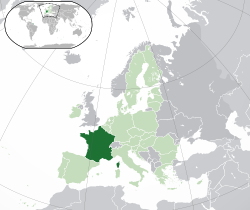
During the Iron Age, what is now Metropolitan France was inhabited by the Gauls, a Celtic people. The Gauls were conquered in 51 BC by the Roman Empire, which held Gaul until 486. The Gallo-Romans faced raids and migration from the Germanic Franks, who dominated the region for hundreds of years, eventually creating the medieval Kingdom of France. France emerged as a major European power in the Late Middle Ages, with its victory in the Hundred Years’ War (1337 to 1453) strengthening French state-building and paving the way for a future centralized absolute monarchy. During the Renaissance, France experienced a vast cultural development and established the beginning of a global colonial empire. The 16th century was dominated by religious civil wars between Catholics and Protestants (Huguenots).
France became Europe’s dominant cultural, political, and military power under Louis XIV. French philosophers played a key role in the Age of Enlightenment during the 18th century. In 1778, France became the first and the main ally of the new United States in the American Revolutionary War. In the late 18th century, the absolute monarchy was overthrown in the French Revolution. Among its legacies was the Declaration of the Rights of Man and of the Citizen, one of the earliest documents on human rights, which expresses the nation’s ideals to this day. France became one of modern history’s earliest republics until Napoleon took power and launched the First French Empire in 1804. Fighting against a complex set of coalitions during the Napoleonic Wars, he dominated European affairs for over a decade and had a long-lasting impact on Western culture. Following the collapse of the Empire, France endured a tumultuous succession of governments: the monarchy was restored, it was replaced in 1830 by a constitutional monarchy, then briefly by a Second Republic, and then by a Second Empire, until a more lasting French Third Republic was established in 1870. By the 1905 law, France adopted a strict form of secularism, called laïcité, which has become an important federative principle in the modern French society.
France reached its territorial height during the 19th and early 20th centuries, when it ultimately possessed the second-largest colonial empire in the world. In World War I, France was one of the main winners as part of the Triple Entente alliance fighting against the Central Powers. France was also one of the Allied Powers in World War II, but came under occupation by the Axis Powers in 1940. Following liberation in 1944, a Fourth Republic was established and later dissolved in the course of the Algerian War. The Fifth Republic, led by Charles de Gaulle, was formed in 1958 and remains to this day. Following World War II, most of the empire became decolonized.
Throughout its long history, France has been a leading global center of culture, making significant contributions to art, science, and philosophy. It hosts Europe’s third-largest number of cultural UNESCO World Heritage Sites (after Italy and Spain) and receives around 83 million foreign tourists annually, the most of any country in the world. France remains a great power with significant cultural, economic, military, and political influence. It is a developed country with the world’s sixth-largest economy by nominal GDP and eight-largest by purchasing power parity. According to Credit Suisse, France is the fourth wealthiest nation in the world in terms of aggregate household wealth. It also possesses the world’s second-largest exclusive economic zone (EEZ), covering 11,035,000 square kilometres (4,261,000 sq mi).
French citizens enjoy a high standard of living, and the country performs well in international rankings of education, health care, life expectancy, civil liberties, and human development. France is a founding member of the United Nations, where it serves as one of the five permanent members of the UN Security Council. It is a member of the Group of 7, North Atlantic Treaty Organization (NATO), Organisation for Economic Co-operation and Development (OECD), the World Trade Organization (WTO), and La Francophonie. France is a founding and leading member state of the European Union (EU).
|





 Adolphe Sylvestre Félix Éboué (1 January 1884 – 17 May 1944) was a French colonial administrator and Free French leader. He was the first black French man appointed to a high post in the French colonies, when appointed as Governor of Guadeloupe in 1936.
Adolphe Sylvestre Félix Éboué (1 January 1884 – 17 May 1944) was a French colonial administrator and Free French leader. He was the first black French man appointed to a high post in the French colonies, when appointed as Governor of Guadeloupe in 1936.  French Equatorial Africa (French: Afrique équatoriale française), or the AEF, was the federation of French colonial possessions in Equatorial Africa, extending northwards from the Congo River into the Sahel, and comprising what are today the countries of Chad, the Central African Republic, the Republic of the Congo, and Gabon.
French Equatorial Africa (French: Afrique équatoriale française), or the AEF, was the federation of French colonial possessions in Equatorial Africa, extending northwards from the Congo River into the Sahel, and comprising what are today the countries of Chad, the Central African Republic, the Republic of the Congo, and Gabon.  Until 1934, French Equatorial Africa was a federation of French colonies like French West Africa. That year, however, the AEF became a unitary entity and its constituent colonies became known as regions, later becoming known as territories in 1937. There was a single budget for the unified colony; prior to unification, each member had had its own finances.
Until 1934, French Equatorial Africa was a federation of French colonies like French West Africa. That year, however, the AEF became a unitary entity and its constituent colonies became known as regions, later becoming known as territories in 1937. There was a single budget for the unified colony; prior to unification, each member had had its own finances. 
 France, officially the French Republic (French: République française), is a sovereign state comprising territory in western Europe and several overseas regions and territories. The European part of France, called Metropolitan France, extends from the Mediterranean Sea to the English Channel and the North Sea, and from the Rhine to the Atlantic Ocean. France spans 640,679 square kilometres (247,368 sq mi) and has a total population of 67 million. It is a unitary semi-presidential republic with the capital in Paris, the country’s largest city and main cultural and commercial centre. The Constitution of France establishes the state as secular and democratic, with its sovereignty derived from the people.
France, officially the French Republic (French: République française), is a sovereign state comprising territory in western Europe and several overseas regions and territories. The European part of France, called Metropolitan France, extends from the Mediterranean Sea to the English Channel and the North Sea, and from the Rhine to the Atlantic Ocean. France spans 640,679 square kilometres (247,368 sq mi) and has a total population of 67 million. It is a unitary semi-presidential republic with the capital in Paris, the country’s largest city and main cultural and commercial centre. The Constitution of France establishes the state as secular and democratic, with its sovereignty derived from the people.


